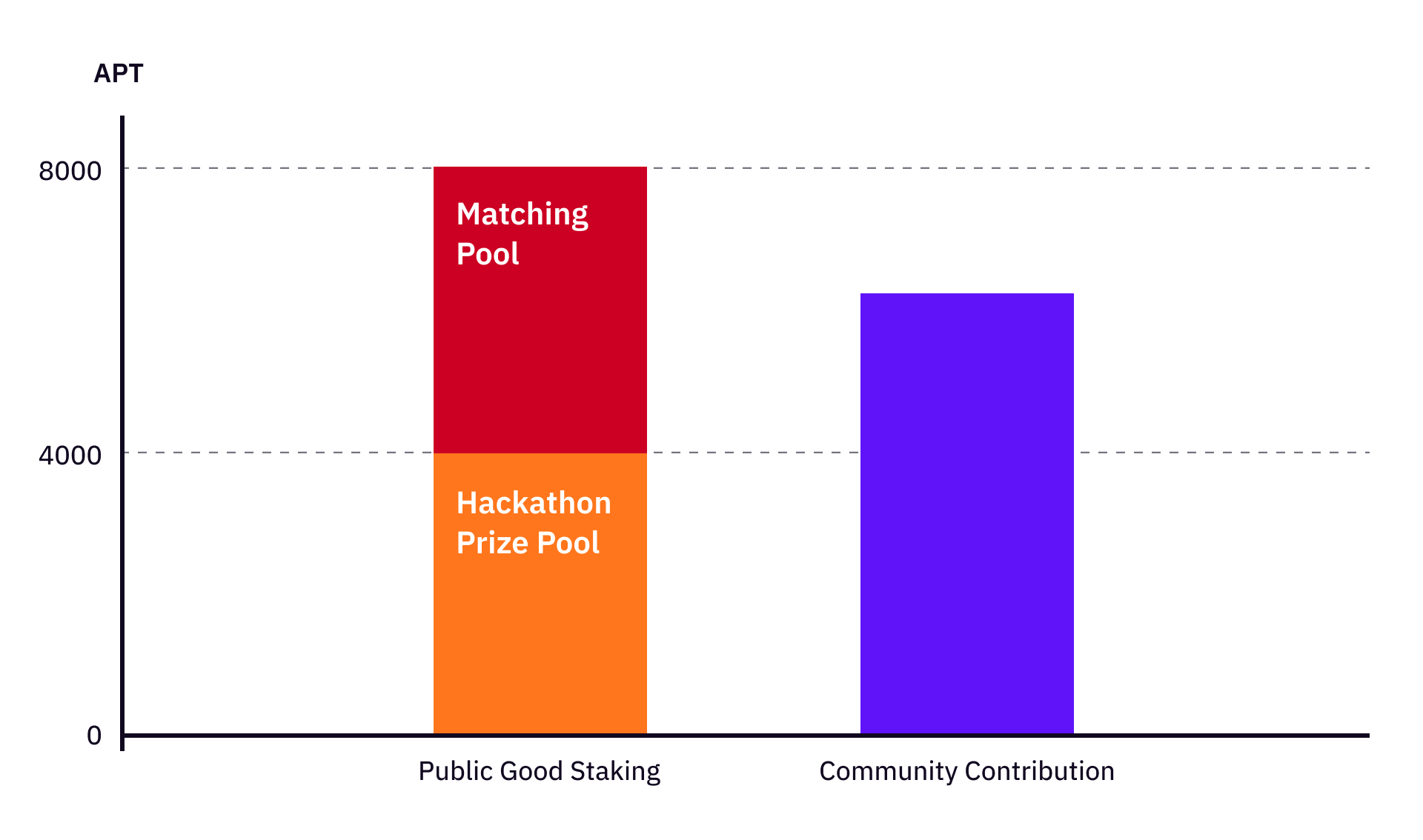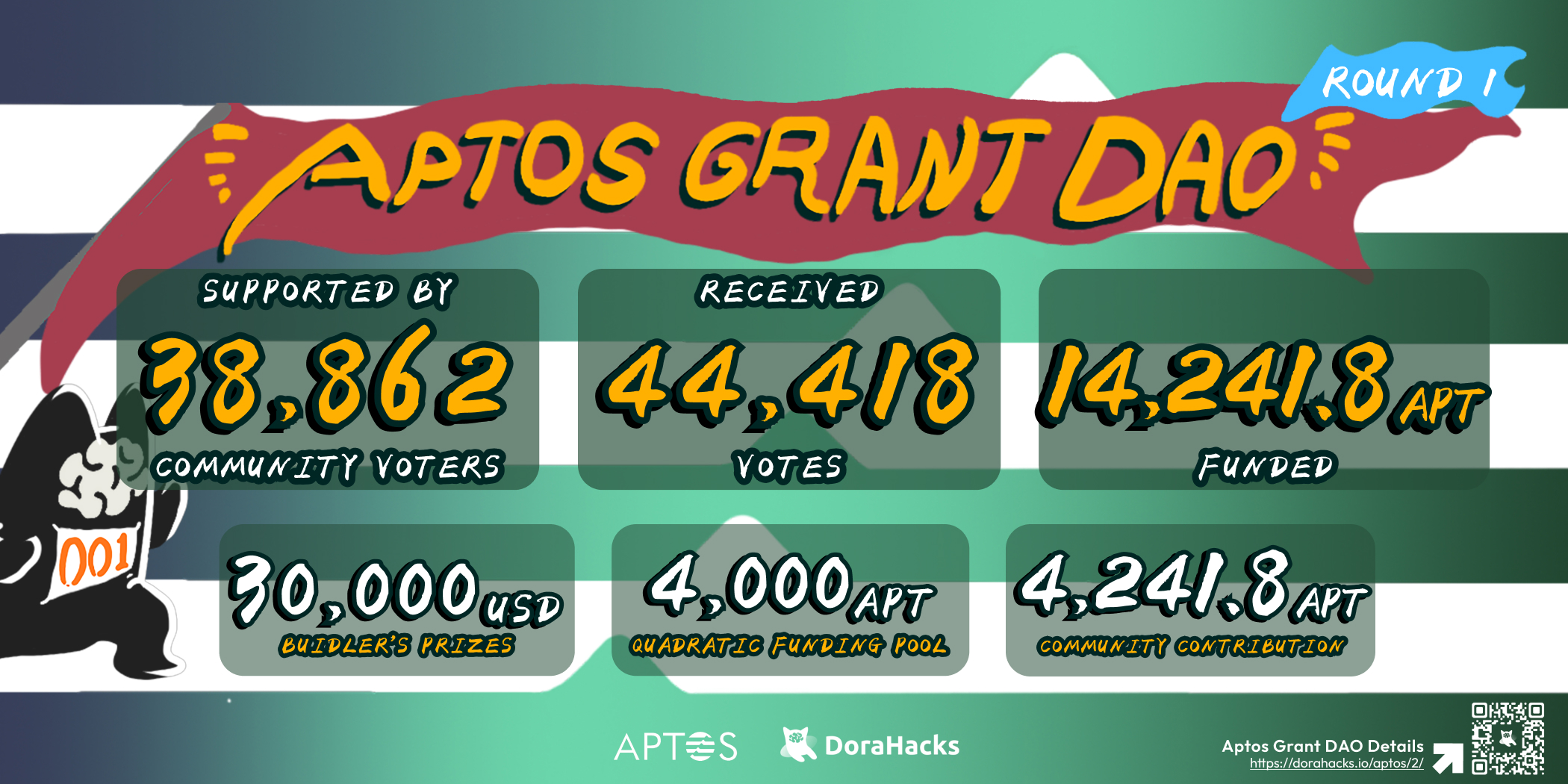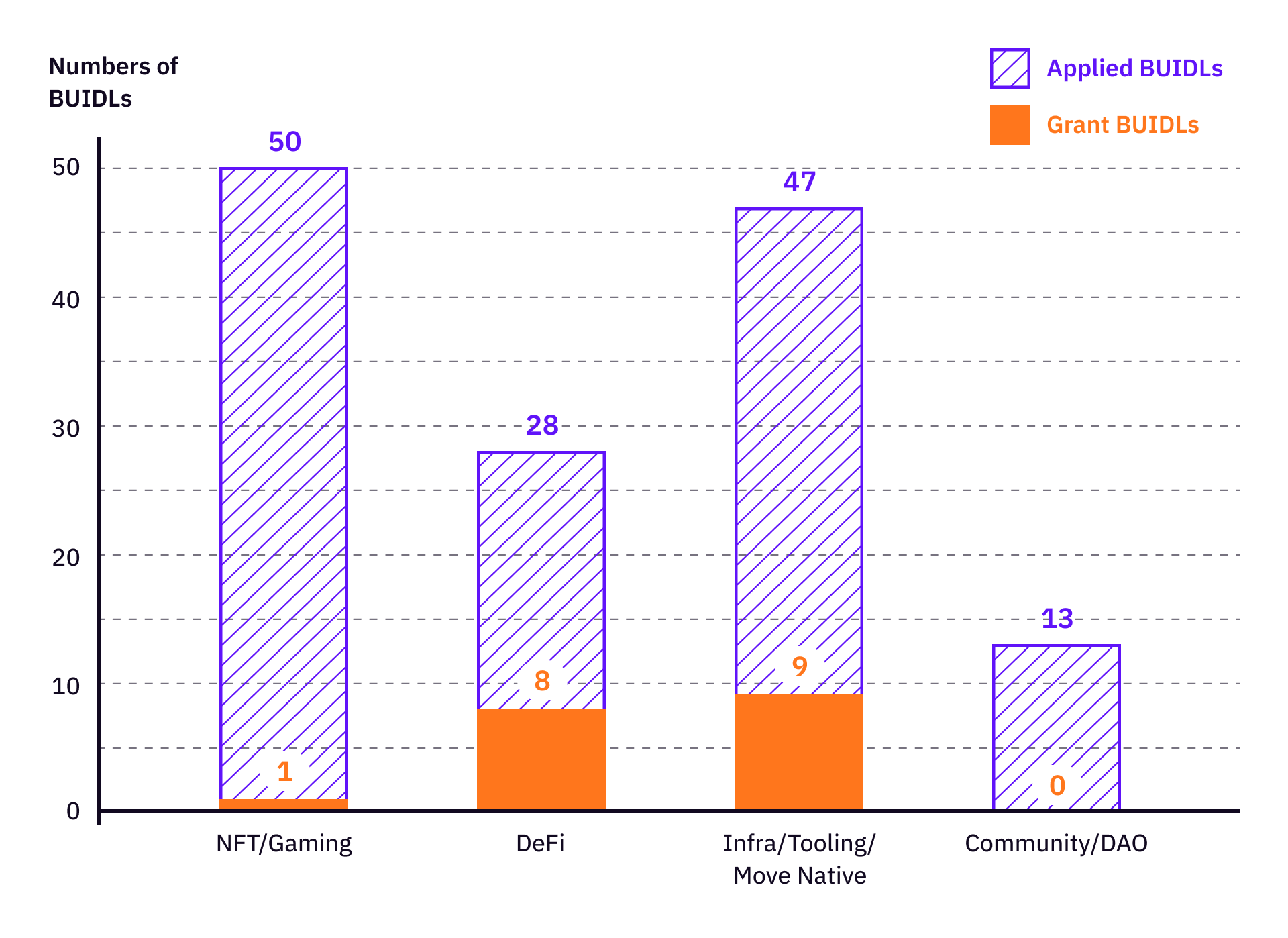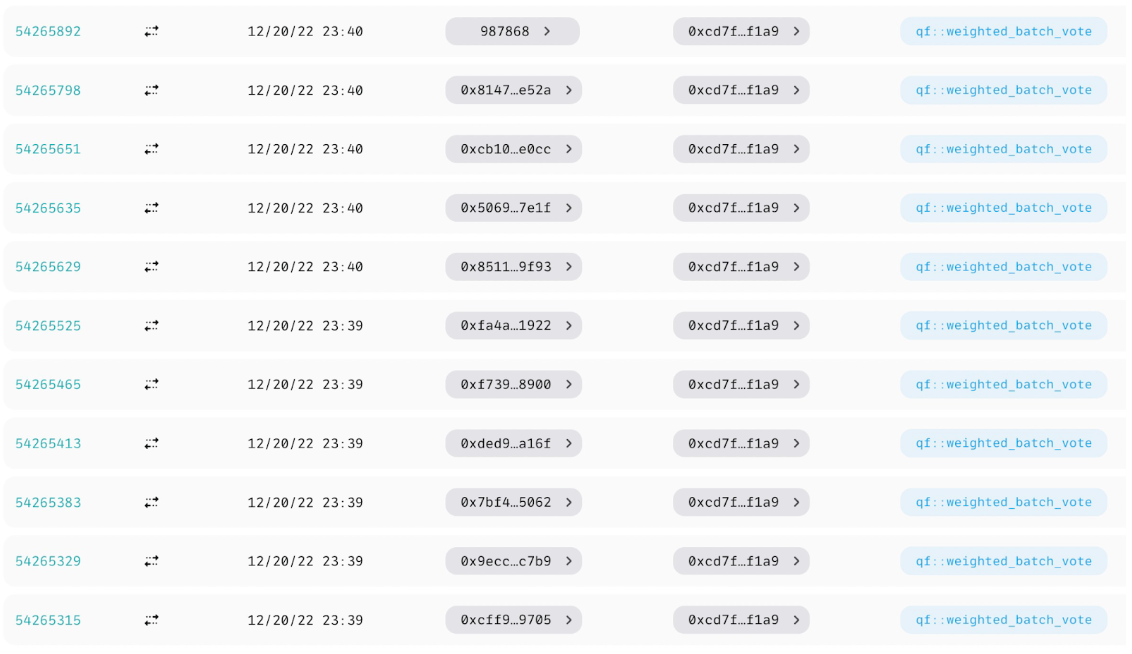A review of Aptos Grant DAO Round-1
Special thanks to Mo Shaikh, Neil H, HC Xie and the Aptos team for discussions and support during the early phase of creating Aptos Grant DAO.
The first round of Aptos Grant DAO just concluded with highest enthusiasm from the community — both the builder side and the contributor side. 18 grantees selected from 137 applicants went into a quadratic voting round, receiving 14,208.9 APT in grant funding — 4000 APT in hackathon prize, 6208.9 APT in community contribution, and a 4000-APT matching pool was distributed based on community quadratic votes.
Beyond the funding round itself, Aptos Grant DAO is an experiment of public good staking, a practical implementation of block incentive driven ecosystem funding. As one of the Aptos network validators, the Dora Factory public good staking node contributed 8,000 APT tokens to the first funding round of Aptos Grant DAO. and it will continue doing so as long as it runs as a validator of the network.

As a result of public good staking, Aptos Grant DAO will be able to continuously fund a wide range of BUIDL teams and maximize the survival rate of all valid ideas. In the long term, the Aptos Grant DAO is expected to help prove or disprove Aptos thesis of all kinds by funding teams working on these ideas. In the process, it gives BUIDL teams time to grow, tests the competence of a team, and builds trust between the team and the community.
On the other hand, as an open-community grant DAO, the continuity of Aptos Grant DAO also depends on effective community governance. An effective community governance mechanism is critical to not only engage all stakeholders from the community, but also make collective decisions efficiently and autonomously.
Round-1 recap
A total of 137 teams submitted their BUIDLs to the Aptos Grant DAO across 5 tracks. While the setup of tracks will evolve over time, the first round of Aptos Grant DAO encouraged builders to work on projects that leveraged the advantages provided by Aptos Network and Move Language. Specifically, we set up an infrastructure/tooling track and a Move native track to fund Aptos/Move public goods.

Putting infra/tooling track and Move native track submissions together, we have approx. ⅓ of all projects relating to Aptos native infrastructure and ecosystem public goods.

From 137 applied BUIDLs, 18 BUIDLs were selected into the first quadratic voting grant round. The selection was strictly based on the following criterias:
- BUIDL is actively developing
- BUIDL is in early-stage and needs grant funding to survive
- BUIDL has not raised significant amount of venture funding
- BUIDL is Aptos native (building Aptos infrastructure or major product is deployed on Aptos)
Here is a list of all 18 grant BUIDLs:
All BUIDLs funded by Aptos Grant DAO are in early-stage development. Mention is not endorsement, it’s more about encouraging the broad developer and builder community to participate in future Aptos Grant DAO funding rounds.
NFT/Gaming
- MuseBot: an AIGC powered one-stop NFTs platform.
Defi
- Nomis <> Aptos: a Credit Karma for DeFi or a multi-chain lending aggregator that smartly connects borrowers with DeFi protocols offering custom loan terms based on borrowers’ on-chain credit scores.
- Aptin Finance: a decentralized lending platform.
- Scale Protocol: an on-chain decentralized derivatives trading hedging tool.
- Cetus Protocol: a DEX and concentrated liquidity protocol focusing on Move-based ecosystems.
- Leviosa: a platform that focuses on maximizing extractable real yield from POS networks.
- Meson: a stablecoin swap protocol facilitating stablecoin free flows among Ethereum, Layer 2s, and major high-performance public chains.
- Mira Finance: index funds that give investors exposure to assets on multiple chains in one click.
- OmniBTC: an omnichain financial platform based on cross-chain interoperability protocols.
Infrastructure/Tooling and Move Native
- Hamster: a DevOps service platform.
- Fewcha Wallet: pure Move self-custody crypto wallet.
- Aptos Dart SDK: an open source Aptos Mobile SDK.
- MoveDID: a DID protocol that is compatible with Move-based blockchain networks.
- Apscan: a blockchain explorer for Aptos.
- MetaSecureLabs-Link3: cross-chain messaging protocol.
- Mokshaya Protocol: open source solutions on Aptos Blockchain.
- Aptos Passport: a protocol that includes domains, DID and SBT.
- Aptools: Make Aptos easy to use for non-tech people.
Stress testing Aptos-native community governance
It’s interesting to note that Aptos Grant DAO itself is an Aptos-native application. The entire voting mechanism is built on open source Move contract with DoraHacks integration. BUIDLs submitted on DoraHacks.io are also registered on the Move smart contract, and all voting were through on-chain transactions on Aptos.
During the 10-day voting period, 38,872 independent Aptos addresses participated in the first round of Aptos Grant DAO voting, and the contract processed 40,851 transactions, both Petra wallet and the Aptos network handled the traffic well.
Because MACI-cart user experience was used in Aptos Grant DAO voting, a user can pick up multiple BUIDLs and vote for all of them in one transaction.

Effective governance and fair distribution
As an open-community grant DAO, Aptos Grant DAO naturally inherits all challenges of quadratic governance. Simply speaking, the goal is to prevent identity hacks, sybil attacks, and unbalanced fund distribution while maintaining permissionless and voter privacy. Fortunately, the mechanism design and infrastructure building efforts at DoraHacks have provided us with enough tools to mitigate many of the challenges. Specifically, two additional measures were applied in Aptos Grant DAO round-1 — Grant funding distribution algorithm (a.k.a progressive tax 2.0), and vcDORA voting weight adjustment.
The grant funding distribution algorithm dynamically adjusts matching pool distribution by reducing the gap between the most matched project and the least matched project. It preserves the rank based on quadratic voting results while maintaining a maximum spread between the most funded and the least funded, which keeps distribution inequality under control.
In the meantime, vcDORA provides a way for community voters to increase voting weight by “verifying” their stake and commitment without disclosing who they are.

Post-round sybil analysis
As a standard procedure of quadratic governance, sybil detection was performed after the round. Sybil detection was done by on-chain transaction pattern matching and user data analysis. The result was impressive — 17136 sybil votes were removed, and 1.07% of total matching pool distribution change.
Thoughts on upcoming rounds and tips for Builders
- Most BUIDLs from Infrastructure/Tooling and Move tracks are native to Aptos or Move blockchains. As the ecosystem is still in its early-stage, we expect more Aptos native public goods that fall into these categories in future rounds to be funded by Aptos Grant DAO.
- Build necessary gadgets that the core dev team doesn’t have time to build, or speed up existing developments. Teams can apply for Aptos Foundation Grant in conjunction with Aptos Grant DAO at DoraHacks.
- Applications are mostly multi-chain oriented. However, we strongly encourage application builders to think about why you build on Aptos and what specific features of Aptos you are going to leverage in your product.
- The most disrupting ideas and applications will come from projects that maximally leverage Aptos features. One example is that token transfer on Aptos does not require user approval, which increases security of both user asset security and application security. Another example is to leverage accurate timestamps to implement real-world performant applications like payments and oracles. There are many more others involving cool properties provided by the Move language.
- There are no BUIDLs selected to the grant round from Community/DAO track. We would encourage more Aptos-native communities, media, and DAOs to apply in round-2!
What to expect next
The Aptos Grant DAO itself is evolving. As an everlasting, open-community grant DAO, there will be more builders and community contributors joining the DAO over time, and more BUIDLs to be funded — open source software, ventures, communities, public goods. Improving the Aptos Grant DAO and making it efficient, fair, and inclusive will be the long standing task of the DoraHacks community. There are some immediate tasks we can start working on.
Adding voter privacy — over time, the Aptos Grant DAO will grow. A larger voter population and more grant funding will require user privacy and collusion resistance. Zero-knowledge proof based voting systems such as MACI-QV can partially increase voter privacy. There are on-going discussions from the dev community about adding zk primitives in Move, such as Groth16, Pederson Committment and Bulletproof verification. Another way is to reuse the existing zk tools and libraries from EVM ecosystems, and bring them to non-EVM public blockchains such as Aptos. The snarkjs-bellman adapter is an example built by the Dora Factory team to connect snarkjs and circom to Rust blockchains. Similar functions can be implemented to bridge snarkjs and Aptos.
The Aptos Grant DAO alumni network — over time, successful BUIDL teams from Aptos Grant DAO will make significant contributions to the Aptos network, forming an alumni network that helps new teams navigate through the survival phase. The network could provide a wide range of assistance from tech mentorship to use case exposure that help new products reach product market fit as soon as possible. We expect an infant alumni network will emerge after 2 or 3 grant rounds, and eventually become an indispensable component of Aptos Grant DAO.
Public good staking for everyone — with public good staking, the Aptos network becomes the first public blockchain in the crypto space to systemically use block incentives to fund ecosystem innovations. Currently, the community can participate in Aptos Grant DAO governance by voting for their favourite teams, but they are not able to join public good staking. Public good staking should be open to everyone, so that everyone who has a stake in the network can contribute to the network’s public goods and new ventures. This might take time because Aptos staking doesn’t support individual staking at this moment. We expect to work closely with the Aptos team and provide community accessible public good staking as soon as the infrastructure is ready.